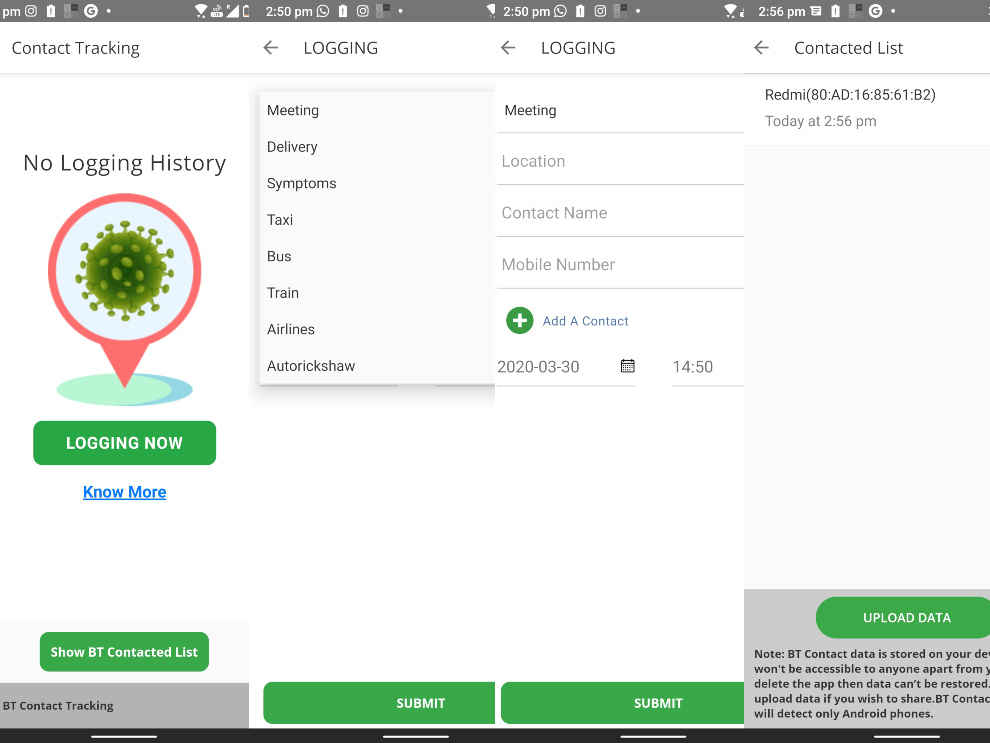While there’s neither a vaccine nor a cocktail of antibiotics that can successfully cure a patient of COVID-19, it’s not entirely impossible to stop the Coronavirus epidemic. The key to curbing the contagion that has now infected 199 countries is to conduct extreme contact tracing. Health officials not only need to find and isolate infected patients, but also those who came in contact with that person. The Ebola virus outbreak that occurred in 2016 in Africa was contained using this method and experts believe, the novel Coronavirus can also be contained in a similar way.
Tracing who the infected person came in contact with can get quite cumbersome, especially in a country like India with one of the highest population densities in the world. Officials may not be able find out the exact number of people who came in contact with an infected person by interviewing and interrogating. It’s also noted that nearly half the transmission occurs before the person even starts showing symptoms. The virus could be spreading for days before anyone can even realise they are infected.
Modern technology may have a solution, albeit with a big caveat.Pandemic researchers across the world have claimed that tapping into cellular services can help track the contagion and warn people who may have been exposed. Some have propagated using GPS services to track large gatherings of people, while some are relying on Bluetooth technology to identify smartphones (and their owners) who may have come in close contact with people infected by the SAR-COV-2 virus.
And that’s exactly what GOQII, the India-based fitness tracking and preventive healthcare app has set out to do. Currently in beta testing, the GOQII fitness tracking app has launched a “Contact Tracking” feature that relies on Bluetooth to find out the number of devices you have come in close proximity with. This feature will help “track every movement, activity and also track those who have been in close contact with them and this app feature will effectively help in social distancing as is recommended by the WHO,” writes Anusha Subramanian on the GOQII blog. Anusha is a two-time award winning journalist and a health and fitness enthusiast.
Implementing Bluetooth-based contact trackingThe contact tracking feature on the app can be used to track your movement and activity to ensure prevention and quick detection of virus carries. It’s essentially self tracking with Bluetooth aiding the memory. For instance, you can track cab drivers, e-commerce delivery agents, and other people you come in contact with. This is important because if you become infected or someone you may have come in contact with become infected, you will be able to trace it yourself and let the authorities know.

The feature presently lets you store your body temperature, COVID-19 symptoms that you may be experiencing, food and activity log with location, log contacts, cab driver and delivery agent details who have served you. By using Bluetooth on your smartphone, you can easily recall who you came in contact with. The app stores data of nearby Bluetooth devices with time to help find out potential patients.
The real benefit of this feature can only be realised once a lot of people start using it. The contacted list has to be uploaded (with the consent of the user) and will be mapped with the database of other users. A large percentage of the population has to be using it to make it more effective.
Bluetooth over GPS?GOQII is not the only app in India that’s trying to track secondary and tertiary SARS-COV-2 infections. The Indian Government itself have come out with an app that tracks user location every one hour and warns if you have come in contact with a COVID-19 patient. However, GPS might not be accurate enough to detect close proximity with people. Bluetooth, in this case, helps.
There’s some history to back up the claim as well. Singapore’s health department in particular is using Bluetooth-based contact tracking to perform real-time tracing. People are asked to join the Trace Together app and to keep their Bluetooth on. Upon encountering a COVID-19 positive person within a two meter proximity, the app will set off an alert all users for 30 minutes.
These are extraordinary times, but should we give up digital privacy?If not for this unprecedented situation, making an app that tracks people using GPS and Bluetooth would have faced severe backlash. But these are not normal times. Yes, you may expose your location to other people or even give up some data about your Bluetooth device (and yourself) in the process, but experts believe that if helps keep the contagion under check, it’s a necessary evil.
“We don’t live in a culture of public trust when it comes to data. We live in this age that has been called the age of surveillance capitalism, where.. our data is abused and exploited,” a ScienceMag article quoted David Leslie, an ethicist at Alan Turing Institute as saying.
The biggest example of this is China. The country known for its widespread surveillance on citizens deployed its mass surveillance tools to classify individuals by their health status and restrict their movements. Israel too has reportedly repurposed its spying infrastructure to trace contact. We are definitely in untested waters here, but these aren’t normal times to begin with.
Having said that, GOQII claims the app does not share user data immediately. It’s up to the user to provide consent and there too, the user can control whether they want to share their logs publicly, or with their friends or keep only to themselves.
from Latest Technology News https://ift.tt/2xzej9c

No comments:
Post a Comment